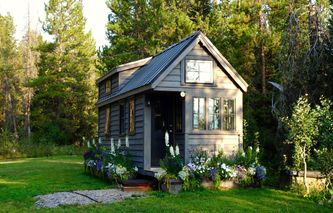According to data published by the Census Bureau, nearly five million homes are sold each year in the United States. For many Americans, buying a home is the single largest investment they will make in their life. It's a decision that affects personal finances as well as lifestyle.
It's also a decision that creates a lot of anxiety. Until they've moved in, buyers are never really sure about the home's condition, the neighborhood, and the commute to work each day. It's important to remove as many of these unknowns as possible before making a commitment.
Additional Resources |
In this article, were going to outline both the steps as well as the concepts encountered when buying a home. We'll start with the financial aspects of the process, then move on to choosing a location. Then we'll talk about the requirements of a home, visually inspecting it, and negotiating with sellers. Finally, we'll provide links to several calculators that can help with the home buying process.
Financing a New Home
To be taken seriously, potential buyers should be pre-approved or pre-qualified for a mortgage. This is a relatively simple process that normally does not involve any commitment to the lender.
Buyers will need to supply some financial information such as a paycheck stub or another proof of income, and answer some questions about their outstanding debt or loans. At the end of the process, the lender will provide an estimate of the maximum amount of money the buyer can borrow, depending on the type of mortgage chosen.
The following are some simple "rules of thumb" that can help borrowers make an informed financial decision.
Term of the Loans
The longer the term (time), the larger the mortgage; since the borrower will be paying off less principal each month. The downside of this approach is the total interest paid will be higher. Lower interest rates can help to offset the total cost of a longer-term loan.
Variable versus Fixed Rates
Adjustable rate mortgages usually offer lower interest rates in the short term when compared to a conventional or a fixed rate mortgage. If interest rates start to creep up, an ARM allows the lender to raise the interest rate on the loan, shifting the risk associated with rising rates to the borrower.
Mortgage Points
Mortgages requiring the payment of points allow the lender to lower the monthly amount due on the loan. Paying points is really just pre-paying some of the loan's interest expense. The following is an important point to remember when selecting a mortgage.
Points are used to lower the monthly payment throughout the life of a loan. They are applied to the interest expense, not the loan's principal. Buying a home and paying two points on a $200,000 mortgage is like prepaying $4,000 in finance charges (2% of $200,000).
If the borrower turns around and sells that home in one month, they've lost nearly the entire benefit of paying points. A rule of thumb to remember goes like this: Borrowers should avoid paying any points if they do not plan to stay in their new home for at least five to ten years.
Annual Percentage Rate
The annual percentage rate, or APR, is the single most important number used to compare mortgages. The APR "normalizes" each different type of mortgage for points, application charges, and other types of loan origination fees. The loan with the lowest APR will always be the best deal for the borrower unless they terminate the loan before it's paid off.
Location: Finding the Right Community
Before working with a real estate agent, buyers should have a good idea of the type of community in which they'd like to live, for example:
Are urban settings preferred over the countryside?
Is the quality of the school systems important?
Is a community pool, soccer and other recreational activities important?
Is mass transit easily accessible?
What is too long of a commute (in time and miles)?
Where is the nearest shopping mall or grocery store?
Note: Depending on your circumstances, you may want to move to a different state where houses are more affordable. To be aware of all your options, it's good to know the average prices for homes in different states.
Once the requirements for the location have been determined, it's time to start thinking about the home itself.
Home Essentials: Wish Lists
One of the first things the real estate agent will want to know is the requirements of the home. For example:
How many bedrooms are needed?
Does the home need a fireplace?
How many bathrooms are needed? Is an ensuite bathroom a necessity?
Is a walk in closet a "must have?"
Is the availability of natural gas, municipal water or sewer systems important?
Real Estate Agents
Choosing the right real estate agent can mean the difference between finding the right home and missing a great opportunity. This is especially true in a hot real estate market. Start the search by asking friends or family if they can recommend a local agent. When meeting with an agent, make sure they are listening and not constantly trying to sell. Good agents are good listeners.
Work with someone that is close to the community. The ideal agent has contacts throughout the town or city, and knows about homes that are going up for sale before they've even been listed.
Timing the Purchase
The best time of year to sell a home is in the April through June timeframe, especially in an area where there are many children — whereas the holiday season around Thanksgiving and Christmas is historically the worst time to buy or sell a house. That's because families don't want to move while school is still in session. In most areas of the country, the housing market starts to heat up just as the school year winds down.
If a buyer has flexibility, better values can be found as the market starts to slow down in September.
Visually Inspecting a Home
When evaluating a new home, buyers should be looking for certain features. Some of these will be obvious, such as the number of bathrooms; but others are not immediately apparent, such as the energy efficiency of the home itself.
Generally, when walking through a home, buyers will want to be looking for the following:
Structural Soundness: Are there squeaks, leaks, cracks?
Physical Attributes: Does the home's features match the buyer's wish list? Does the home have an open floor plan and adequate closet space?
Lot Size: Is there a lot of room to run around? Is maintaining a large yard a chore or a chance to escape? Is there a busy street nearby?
Layout: Will the floor plan of the home accommodate the buyer's furniture?
Maintenance: Are the major appliances new or in need of immediate replacement? What's the furnace or boiler look like? Does the home look like it's been maintained and updated, or has the owner recently put a new coat of paint on the ceiling to cover up a leaking roof?
Negotiating with Sellers
When buying a home, everything is negotiable. It is often the case the seller is willing to pay for all, or a portion, of the closing costs. At the close, the buyer is often expected to come up with thousands of dollars to pay for fees and other expenses associated with buying a home. Since the seller is usually in a better financial situation, the buyer often can negotiate with the seller to have them help pay for these expenses.
The remedy of problems discovered during the home's inspection should also be negotiated with the seller. If the condition of the home is found to be materially different than when the bid was placed, it's time to negotiate a new price.
Home Buying Resources
This website has a number of resources that can help buyers with their purchase decision. In our article on amortization schedules, we have a total of seven different tables that can be used to calculate monthly loan payments and visualize what happens to the loan over time.
We also offer a wide assortment of online mortgage calculators that can help users compare mortgages, figure out the impact of paying points, or the financial implications of taking out a balloon mortgage. We even have a calculator that can help figure out how much money the buyer can borrow.
About the Author - How to Buy a Home

.jpg)

